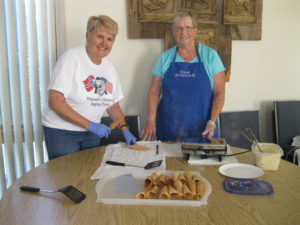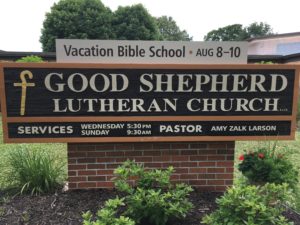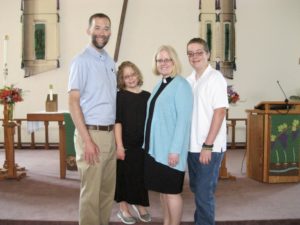Sermon for Sunday, July 9, 2017
Fifth Sunday after Pentecost July 9, 2017
Good Shepherd Lutheran Church
Decorah, Iowa
Rev. Marion Pruitt-Jefferson
First Reading: Zechariah 9:9-12; Psalm 145: 8-14; Second Reading: Romans 7:15-25a; Gospel: Matthew 11: 16-19; 25-30
Beloved of God, Grace and Peace to you from Jesus, our hope and our salvation.
These are some pretty familiar texts we’ve just heard, and it wouldn’t surprise me if some of you may be wondering when we’re going to break out Handel’s Messiah. “Come Unto Me all you who labor and are heavy laden, and I will give you rest.” “My Yoke is Easy and my Burden is Light” and that sparkling soprano aria “Rejoice, Rejoice, Rejoice Greatly O Daughter of Zion” Unfortunately, we won’t be able to indulge in those stirring musical renditions of Jesus’ words, but we can spend a few moments pondering their meaning for us today.
To those who are suffering and who have given up hope, Zechariah says REJOICE! He’s addressing the people of Israel who were held captive in Babylon. Now they have been released and allowed to return to Jerusalem. But return to what???? Their temple is destroyed, the city is in ruins, the economy has ground to a standstill, the people are hungry and poor and they are languishing in despair. They have longed for a return to the ways things used to be– when mighty kings ruled over them and all of Israel’s enemies were subdued. That has not come to pass.
Enter Zechariah who announces a new hope. A new vision for the future. Zechariah tells of a messianic King whose dominion will be a radical reversal of the established order. This Sovereign will not rule with the power of military strength, but with righteousness and humility. This king will not be one who sits in the safety of a far off palace, removed from the people. He will be a ruler who comes into their midst – who does no shy away from entering into their suffering and despair. This king does will stand in domination over the people, but will draw near to them…. will stand beside them. And identify himself with their pain. (I’m reminded of Pope Francis, who has shunned the lavishness of the palace to live simply in a guest house. Who goes to the places where people are suffering, homeless shelters, hospitals, refugee camps.)
In describing the King’s arrival Zechariah does say that this promised ruler will come Triumphant and Victorious, which at first seems to call to mind great military victories. But the deeper meaning of these Hebrew words has nothing to do with battle. They are words of faith: Triumphant meaning Righteous and Victorious meaning Saved. This King will not stride into town on a mighty war horse flashing his sword. Instead, he shows up riding a donkey – and a baby donkey at that. This King comes in lowliness and humility, riding an animal hardly fit for a child, much less a king.
The first thing this new king will do is to enact a program of disarmament and demilitarization. Gone are the chariot, the war horse, the battle bow. This ruler will be the King of Peace – who commands peace to ALL nations – to farthest reaches of the sea. Resources previously spent on military build-up, on weaponry and armies, now will be available to enact those programs which build-up all the people and make for peace and prosperity. Feeding the hungry, caring for the sick, tending to the widow, housing the orphan, welcoming the stranger, rebuilding the temple, restoring the granaries, the fields and the orchards, renewing the whole economy so that all have a share in its abundance.
The promise of a righteous, just and merciful sovereign is a powerful word of hope for people whose lives are marked by suffering and despair. It is a hope that we, too are called to share in, and to strive towards.
In the prophet’s words, we recognize this hoped for King to be Jesus – the King of Peace, the King of righteousness, the king of Love. That is why each year on Palm Sunday we hear Zechariah’s prophecy: “Lo! Your King comes to you, humble and riding on a donkey.” In Jesus’ life the true nature of God’s coming kingdom is revealed – a kingdom where the hungry are fed, the poor are lifted up, and the rich and powerful are sent away empty. Under God’s gracious rule, the powers of this world are subjugated to the power of love and compassion. Things are no longer as they’ve always been – but as they should be. In Jesus’ death and resurrection we see that not even the power of death can hold sway against the power of God’s endless life.
Like the Israelites of old, we too still await the fulfillment of the promised kingdom. We long to see a world in which our leaders rule with integrity and justice, and with compassion towards those who lives are marked by the heavy burdens of poverty; those who are wearied by the daily struggle to provide for their families – the ones who have more month than money and can’t escape the continual burden having to decide between food or medication, rent or heat. We long for a world where the heavy burden of racism and prejudice is lifted from the shoulders of those who suffered violence, and have been excluded from the usual educational and economic systems that can lead to a better life. We long for a day when everyone will have access to medical care. Where no one will be burdened with the worry about losing their care coverage, or about facing bankruptcy because of their medical bills. We long for a world where no one will be labeled as an alien, or live daily in fear of officials arriving at the door to take children from parents of parents from children. We long for a world where the more than 20 million displaced people will be welcomed into new homes, into places of safety and refuge. This is not a Democratic vision, or a Republican vision….this is God’s dream for us and for all people. And we who have been claimed as citizens of this new kingdom, who in Holy Baptism have died and risen to new life in Christ, are called to claim this vision as our own. To live as prisoners of Hope, and to carry this hope, in word and deed, to all those whose lives are filled with suffering and despair.
This morning Jesus invites us today to Come to Him – to share in God’s dream, God’s vision for all humanity, and all creation. Jesus says: Come to me and listen to my Word. Hear again the promises of God. Come to me…..see me in the faces of your neighbors, in the faces of those who are carrying heavy burdens, who long to experience justice, mercy and compassion. Come to me and be fed at my table. Eat this bread and wine which are my life for you. Jesus invites us to come to him, to be renewed in hope and joy, and then to go out to all the places of pain and suffering in our world, bearing that hope to all longing to hear the good news of God’s kingdom.






